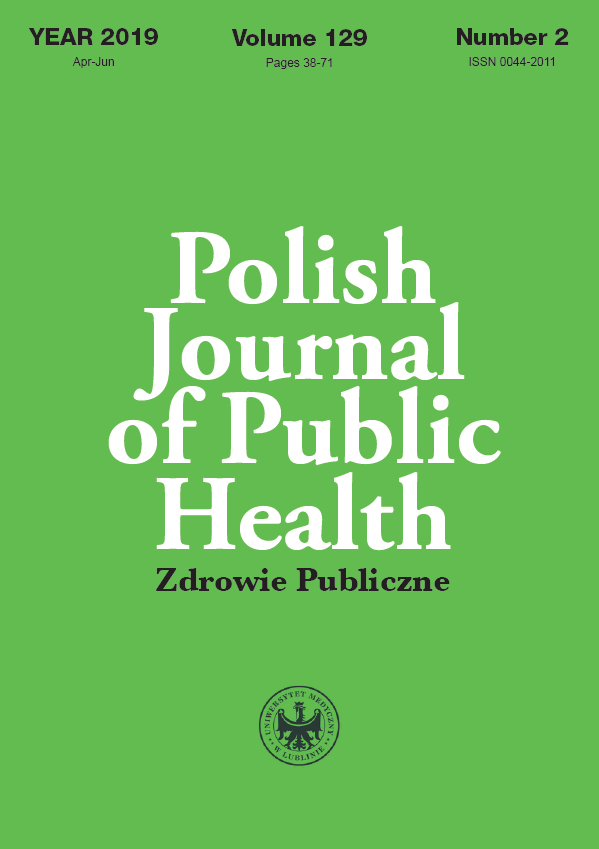Emigration as a way to a better future? – plans for international migration among students of the Medical University of Lublin
DOI:
https://doi.org/10.2478/pjph-2019-0009Keywords:
migration, emigration, student, medicine, specializationAbstract
Introduction. Completing medical studies provides many opportunities. The professional qualifications of doctors are recognized in most hospitals in the European Union and the freedom of movement is conducive to migration abroad. Financial conditions also encourage searching for work in other countries.
Aim. The main purpose of this paper is to present the problem of international migration through the eyes of students of the Medical University of Lublin. We carried out an analysis of the motives and activities which lead students to look for work abroad.
Material and methods. The study was conducted in 2018 using the diagnostic survey method. The 3rd-6th year students of the medical faculty were given the task to fill out an online questionnaire. As many as 63.2% of the 87 respondents were women. The questionnaire included 10 questions regarding the demographic situation of the respondents, their willingness and motives to take up work abroad in the future, and also the actions they are taking to reach that goal (e.g. learning foreign languages).
Results. After completing their medical studies, 32 respondents (36.8%) plan to start working outside of Poland. It was found that men declare a desire to emigrate more often than women (p=0.002). The motivation of people deciding to stay, turned out to be the proximity of their family home, while emigration was motivated mainly by financial reasons (32 people, 100%) and more specialization opportunities (28 people, 87.5%). Germany was the most frequently mentioned migration destination by the respondents. There was a strong relationship between the foreign language which the respondents were learning and their planned direction of emigration (p=0.029, V=0.643).
Conclusions. Foreign emigration is considered by an increasing number of medical students. Third year students also take into account working abroad. Due to the issue of migration, it is necessary to look for strategic actions that will ensure the proper functioning of healthcare in Poland.
References
1. Dunaj B. Słownik współczesnego języka polskiego. Warszawa: Wydawnictwo Wilga; 1996. p. 521.
2. Maciąg A. Współczesne problemy migracji personelu medycznego w Polsce i Europie. Ekonomia i Prawo. 2012;2:99.
3. http://www.rp.pl/Lekarze-i-pielegniarki/303269942-Lekarze-spoza-UE-nie-beda-musieli-nostryfikowac-dyplomu.html (assessed: 24.06.2018).
4. Krajewski M. O metodologii nauk i zasadach pisarstwa naukowego. Uwagi podstawowe. Gliwice: Uniwersytet Śląski; 2010.
5. Andrews FM. Construct validity and error components of survey measures: A structural modeling approach. Public Opinion Quarterly. 1984;48:409-22.
6. Cook C, Heath F, Thompson RL. A meta-analysis of response rates in web-or Internet-based surveys. Educ Psychol Meas. 2000;60:821-36.
7. Dillman DA. Mail and internet surveys: The tailored design method (2nd ed.). New York: Wiley; 2007.
8. Wasilewski P, Łuczak J. Stan kadry medycznej w Polsce. Kontr Państw. 2016;5:63-77.
9. Jędrkiewicz H. Problematyka migracji lekarzy specjalistów w wybranych czasopismach i na internetowych forach medyków. Probl Hig Epidemiol. 2012;93(1):216-22.
10. Jośko J, Kostkiewicz M, Mazurek M, et al. Ojczyzna czy obczyzna? – plany zawodowe studentów Śląskiej Akademii Medycznej. Probl Hig Epidemiol. 2007;88:20-3.
11. Kudlicki L. Nowa Wielka Emigracja. Bezpieczeństwo Narodowe. 2006;1:90-110.
12. Kautsch M. Migracje personelu medycznego i ich skutki dla funkcjonowania systemu ochrony zdrowia w Polsce. Zdrowie Publiczne i Zarządzanie. 2013;11(2):169-79.
Downloads
Published
Issue
Section
License
Copyright (c) 2019 Polish Journal of Public Health

This work is licensed under a Creative Commons Attribution-NonCommercial-NoDerivatives 3.0 Unported License.


